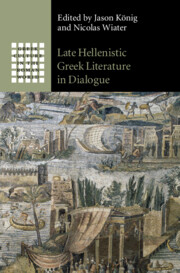Book contents
- Late Hellenistic Greek Literature in Dialogue
- Greek Culture in the Roman World
- Late Hellenistic Greek Literature in Dialogue
- Copyright page
- Contents
- Figure
- Contributors
- Preface
- Abbreviations
- Introduction
- Chapter 1 The Empire Becomes a Body
- Chapter 2 Pyrenaean Mountains and Deep-Valleyed Alps
- Chapter 3 Sailing the Sea, Sailing an Image
- Chapter 4 Ecocritical Readings in Late Hellenistic Literature
- Chapter 5 Civic and Counter-Civic Cosmopolitanism
- Chapter 6 The Wrath of the Sibyl
- Chapter 7 Imagining Belonging
- Chapter 8 Philosophical Self-Definition in Strabo’s Geography
- Chapter 9 Narrating ‘the Swarm of Possibilities’
- Chapter 10 ‘Asianist’ Style in Hellenistic Oratory and Philostratus’ Lives of the Sophists
- Chapter 11 Greek Reading Lists from Dionysius to Dio
- Chapter 12 Envoi
- References
- Index Locorum
- General Index
Chapter 11 - Greek Reading Lists from Dionysius to Dio
Rhetorical Imitation in the Augustan Age and the Second Sophistic
Published online by Cambridge University Press: 21 April 2022
- Late Hellenistic Greek Literature in Dialogue
- Greek Culture in the Roman World
- Late Hellenistic Greek Literature in Dialogue
- Copyright page
- Contents
- Figure
- Contributors
- Preface
- Abbreviations
- Introduction
- Chapter 1 The Empire Becomes a Body
- Chapter 2 Pyrenaean Mountains and Deep-Valleyed Alps
- Chapter 3 Sailing the Sea, Sailing an Image
- Chapter 4 Ecocritical Readings in Late Hellenistic Literature
- Chapter 5 Civic and Counter-Civic Cosmopolitanism
- Chapter 6 The Wrath of the Sibyl
- Chapter 7 Imagining Belonging
- Chapter 8 Philosophical Self-Definition in Strabo’s Geography
- Chapter 9 Narrating ‘the Swarm of Possibilities’
- Chapter 10 ‘Asianist’ Style in Hellenistic Oratory and Philostratus’ Lives of the Sophists
- Chapter 11 Greek Reading Lists from Dionysius to Dio
- Chapter 12 Envoi
- References
- Index Locorum
- General Index
Summary
This chapter compares two reading lists of Greek literature, one from the Augustan Age and one from the Second Sophistic: Dionysius of Halicarnassus’ On Imitation and Dio of Prusa’s letter On Training for Public Speaking (oration 18). Although several scholars have argued that the two lists are similar, this chapter argues that they are fundamentally different. Dionysius prefers Homer, Aeschylus, Sophocles, Herodotus and Demosthenes, he ignores Hellenistic and imperial writers, and he demands that his students work hard. Dio recommends Menander, Euripides, Xenophon and Aeschines, he includes orators from the Augustan Age, and he tells his addressee that laborious training is not needed. In many points Dio’s reading list corresponds more closely to Quintilian’s contemporary canon (in Institutio oratoria book 10) than to Dionysius’ On Imitation. Three factors can explain the differences between the reading lists presented by Dionysius and Dio: their audiences, the literary preferences of the Augustan Age and the Flavian Age, and the genres of their works. Dionysius’ reading list is part of a serious rhetorical treatise which foregrounds the ‘beauty’ of classical Greek literature. Dio’s reading list is presented in a light-hearted letter which adopts a more pragmatic (and at times humoristic) approach to rhetorical imitation.
Keywords
- Type
- Chapter
- Information
- Late Hellenistic Greek Literature in Dialogue , pp. 319 - 350Publisher: Cambridge University PressPrint publication year: 2022



